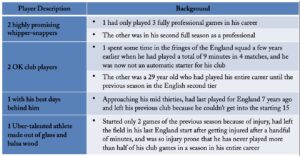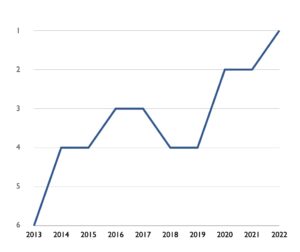You Focus on Now You Miss the Fundamentals
England’s rugby team performed poorly again in the annual 6 Nations tournament. All the talk from analysts, experts, former players and coaches, and sundry pundits was about the head coach Eddie Jones. They talked about his tactics, his team selections, and of course whether he should keep his job. Only one comment in my bloated rugby news feed questioned whether there might be something wrong with the fundamentals of the game in England. All the rest was about decisions going into match day.
It’s received wisdom that England has the biggest player base in the world to choose from. So how can the problem be the fundamentals if a coach can choose from such a rich buffet? Let’s have a look.
England’s Overflowing Conveyor Belt of Young Talent
There’s certainly a rich fountainhead of young talent supplying English rugby. England’s under-20s youth team has a winning record of 65% or more against every team in the world except New Zealand. The team has won the under-20s 6 Nations 9 times in the 18 completed tournaments. In the last 7 under-20s Rugby World Cups the England team has reached the final 6 times and won it 3 times.
What – No Inside Centres?
Despite this multi year reservoir of winning raw material, the senior England team spent the whole tournament with a key player out of position. Engalnd’s best outside centre playing in the very different inside centre position, where he never plays his club rugby. The overt reason for this is that England’s best inside centre was injured before the first game. The coach thought England no other uninjured inside centres were good enough.
This makes no sense given the overflowing conveyor belt fountainhead of young talent, does it? Maybe there’s something else going on in between the youth development and the national team. So let’s look at the clubs, where these young players develop into seasoned full grown pros.
Yes – No Inside Centres
England’s top professional rugby competition, the Premiership, has 13 teams. Here are the starting inside centres in these teams in the first match of the 2021-22 season. 6 were England qualified and their combined creds don’t look great:

There’s plenty of speculation on the reasons for this paucity. The most believable is that clubs bring in talented foreign players at the peak of their ability. So the young English talent gets fewer opportunities to develop. Whatever the reason, the England qualified inside centre choices don’t seem to be what they should be.
The Second Tier Development Ground is Living on Breadcrumbs
Only 13 Premiership teams have places. So young and developing players often find themselves in the second tier Championship competition. These players are often dual registered with both a Championship team and the Premiership team whose academy they came through.
English rugby’s governing body, the RFU, cut funding per club in half to £288,000 per club for the 2020-21 season. To put this in perspective, £288,000 is about a third of what the England head coach is paid. And it is considerably less than what the England squad receives in match payments in a single game.
The cartel of clubs that owns the top tier Premiership then announced in the 2021-22 season that no Championship club would be promoted. They gave a reason that all the clubs in the running for promotion had insufficient ground capacity. This, despite the fact that some existing Premiership clubs had typical gates well below those requirements.
So the incentives and economic feasibility to develop a better second tier has pretty much been turned off. With that a poorer development ground for talented young coaches and players, poorer training facilities and lower quality competition.
Toulon Unbeatable, France Unbearable
This story of a huge conveyor of talent getting minimal opportunities to progress is a familiar one to our Gallic cousins. They decided to do something about it a decade ago, which seems to have worked.
The previously mighty French rugby club, Toulon, won the top flight European club rugby competition for 3 years in a row from 2013 to 2015. In each of those finals the number of France qualified players in Toulon’s starting 15 was never more than 4. And over the same period, the French national team’s placing in rugby’s 6 Nations competition was 6th, 4th and 4th.
France Fixed the Club Problem in a Decade Long JIFFy
The French rugby federation wanted to address this national underperformance and the broader concerns of clubs buying success with foreign players. So the French rugby federation and top 14 clubs toughened up its “JIFF” system. It required gradually increasing numbers of French qualified players in the match day 23 and broader squad. The federation also increased penalties for non compliance. It applied this to the fully professional and well funded second tier.
This resulted in a 2021-22 season where around 70% of the players in the top 2 divisions are qualified to play for France. And young French talent gets the chance to develop and shine. It’s taken some time but look at what happened to France’s 6 Nations record as the systems rules gradually tightened following that great Toulon champions cup victory.
France 6 Nations Placing 2013-2022

None of this is to say that what we do on match day doesn’t matter; of course it does. But it is to say that we get lost in the drama of the moment. And so we over invest in present day fixes and under invest in the fundamentals that create the conditions for future match days to be good.
You Focus on Now, You Miss the Fundamentals – Actually Important Non-Rugby Applications
This has been about rugby, but this is just a trivial subject on which to emphasise an important point. Our obsession with fixing match day means we don’t pay anywhere near enough attention to the fundamentals that make a much bigger difference in the future. Here’s a handful of business examples of fundamentals trumping match day tactics:
- Data since the 1970s has shown that finding ways to increase service and product quality increases profit to a degree that you just can’t make up for with clever match day marketing
- Working out the highest profitability of different service lines and customer types to focus on makes much more difference than tinkering with match day pricing to win a bid or extract another percent
- Having account managers schedule regular sessions with customers to talk through their challenges for the future creates a more reliably growing business than all nighter match day responses to tenders
- Staying technically at the front of your business’s field creates more credibility than match day hires or mini acquisitions
I’m sure the smart readers of these articles can work out some pretty good examples of the same pattern in politics, agriculture and health. I’d be interested to hear your views.
This stuff takes thought to work out the right thing to do. It fits in the important not urgent box that should get done but doesn’t. But if we don’t do it then we’re forever tinkering our match day tactics.
It pains me to say this but let’s take a leaf out of French rugby’s playbook. Let’s at least spend part of our day week and month improving the fundamentals that make next year’s match day tactics a little less of a concern.





